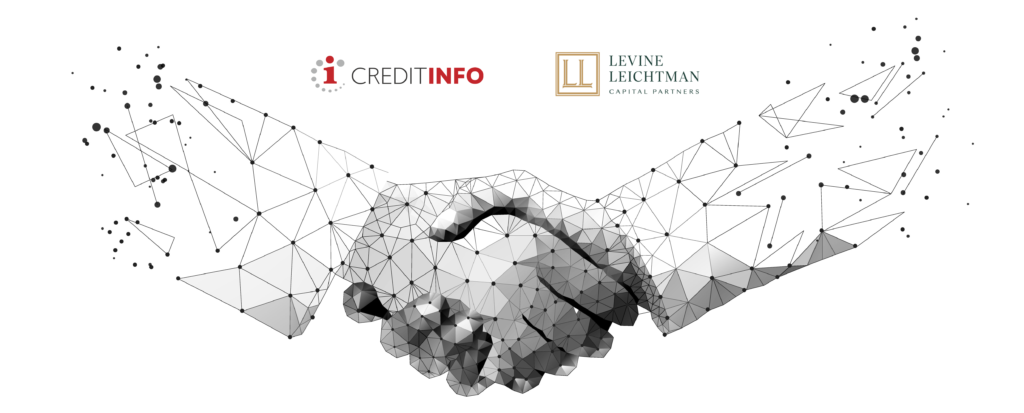Creditinfo Group becomes sole owner of International Bureau of Credit Histories in Ukraine

Creditinfo is investing in IBCH to improve its credit information sharing system
KYIV, UKRAINE, May 24, 2021 – Creditinfo Group, the leading global credit information and fintech services provider, today announces that it has become the sole owner of Ukraine’s International Bureau of Credit Histories (IBCH). Creditinfo aims to improve access to financial services for Ukrainians and support financial institutions with a full suite of best-in-class credit risk management tools.
Established in 2006, IBCH is one of three main credit bureaus in Ukraine. It offers a portfolio of products and solutions for credit risk management, expanding business opportunities, preventing fraud risks and NPL management improvement. Also, IBCH gives access to credit histories for individuals and legal entities.
“This investment shows Creditinfo’s renewed commitment to both the IBCH and Ukrainian financial market overall,” commented Seth Marks, Managing Director, Creditinfo Central & Eastern Europe. “We have been a partner of IBCH since launching in Ukraine. We have also established our credentials in more than 30 countries, also in the region, opening bureaus in Georgia, Kazakhstan, Kyrgyzstan and the Baltics. We hope that this new investment and our wealth of international experience will help us further entrench IBCH and the Creditinfo brand in the Ukrainian financial services space as we partner with lenders to drive financial access through the use of best practices in credit risk management and data protection. Ukraine is an ever-evolving and developing market with considerable growth potential. We are eager to play a role in aiding this growth.”
Kateryna Danylchencko, IBCH General Manager, added, “this is a new important step forward for IBCH. Our team is energised by the opportunity to be a part of Creditinfo, and we hope to utilise the company’s expertise to assist us in the introduction of new products and services.”
About Creditinfo
Established in 1997 and headquartered in Reykjavík, Iceland, Creditinfo is a provider of credit information and risk management solutions worldwide. As one of the fastest-growing companies in its field, Creditinfo facilitates access to finance, through intelligent information, software and analytics solutions.
With more than over 30 credit bureaus running today, Creditinfo has the most considerable global presence in the field of credit risk management, with a significantly greater footprint than competitors. For decades it has provided business information, risk management and credit bureau solutions to some of the largest, lenders, governments and central banks globally to increase financial inclusion and generate economic growth by allowing credit access for SMEs and individuals.
For more information, please visit www.creditinfo.com
Media Contacts:
Caterina Ponsicchi
Group Marketing Director
Creditinfo Lithuania ISO27001 certified

Creditinfo Lietuva collects, stores and analyses information about the creditworthiness of businesses and individuals, assesses their credit history and assigns appropriate credit ratings. To meet the highest data security standards, the bureau introduced an ISO certified information security management system in 2014.
The system complies with the requirements of ISO/IEC 27001:2013 and is constantly reviewed, revised and subject to annual audits. On 26 April 2021, “Creditinfo Lietuva” successfully passed the periodical annual audit performed by “Bureau Veritas”.
The audit assessed the entire organization against 22 compliance criteria, including the competence and data security awareness of leadership and staff, information security management, business management procedures, sharing of responsibilities, management of documents, planning and control, activity monitoring and analysis, internal audit procedures, ability to swiftly resolve issues, continuous improvement, etc.
The audit also assessed the competence of employees of all levels, security of the information systems, IT and support, compliance of the information analysis and sales departments with the ISO requirements. The physical security and business policies of Creditinfo Lietuva were addressed by the audit as well.
The 2021 audit concluded that the information security management system of Creditinfo Lietuva meets the highest standards and can be considered a good practice. Data security in the company is given the highest priority, internal and external risks are constantly monitored and analyzed, and the company is prepared to address the risks in a professional manner.
Creditinfo analysis reveals Lithuanian textile industry severely hit by the pandemic

According to Creditinfo Lietuva, the textile industry of Lithuania is among the business areas which was hit by the pandemic extremely hard. In some sectors of the textile industry, the revenue is 30% below where it was before the pandemic, clothing manufacturers lost 11.7% and leather companies 31% of their employees. 17% of clothes making companies and 15% of textile manufacturers have been given high or very high bankruptcy risk scores.
“Textile industry, an extremely important business sector in Lithuania, is facing unprecedented challenges all over the world. Together with services, tourism and catering, the textile business has been suffering from a severe hit the consequences of which will persist for many more months to come”, says Aurimas Kačinskas, General Manager at Creditinfo Lietuva. “Unfortunately, there is little room for optimism in the immediate future of the sector, which means we‘ll have to keep business partners of the sector under a magnifying glass for quite some time”.
Further Downfall by 30% is Forecast if Global Lockdown Continues
A few days ago, “Coface” published its latest analysis of the global economy, where the economic forecast was downgraded only for the Central and Eastern Europe textile sector, while the textile industry itself, like global textile, was moved from high risk to the very high risk category. It means that no recovery or return to the pre-covid level is expected in textile industry until the end of the year. According to “Coface”, in the best-case scenario the decline of the textile industry will come to a halt at the end of the year, provided there are no new lockdowns introduced globally. If the countries worldwide continue imposing movement and social contact restrictions, this year will only see a further shrinking of the textile industry down to 30 percent of its volume in 2020, the year of hardship.
According to Statistic Department of Lithuania, the textile industry of Lithuania is made up of companies engaged in clothes making, textile manufacturing, leather processing and leather manufacturing businesses.
Employment at Leather Companies Plunged by 31 per-cent
According to Creditinfo, 949 companies reported textile-related activities as their core business last spring; there are 942 of such companies this year. Although the difference is slim, the true impact of the pandemic is revealed by the employment statistics. For instance, over the period of one year the number of employees at the clothes making companies dropped from 15,142 to 13,364 (11.7 per cent), and from 684 down to 472 (31 percent) at leather processing and leather manufacturing companies
Analysis conducted by Creditinfo revealed the revenue of textile manufacturing companies shrunk by 3.1 percent (from EUR 470.4 million to 455.8 million) compared with their revenue in 2019. The same trend was observed at the cloth making companies, where the revenue dropped by 19.9 percent from EUR 457.1 million down to 365.9 million, and leather processing and leather manufacturing companies with revenue going down by 30.2 percent from EUR 23.1 million to 16.2 million.
“We noticed that small and medium sized textile companies suffered the most, while large companies still had orders to fulfil”, says the CEO of the credit bureau. “Yet it is rather likely that the further shrinking textile market this year will reduce the number of orders for the large companies, too. It means that even more employees will be forced out of their jobs in the sector”.
1/6th of Companies with High and Very High-Risk Scores
According to the credit bureau, about 17% of cloth making companies and 15% of textile manufacturers currently are ranked as high bankruptcy risk companies.
“Earlier, the textile business was growing for quite some time, and so did the creditworthiness of the companies. Currently, the risk scores of textile companies brought them in line with problem sectors such as construction and transport”, Kačinskas explains.
Moreover, experts of the credit bureau noted, that only 25 percent of the companies in the textile industry submitted their financial statements for 2020. “It seems that only companies applying for subsidies or other pandemic-related reliefs submitted their financial statements as they were required to get the subsidies”, says Kačinskas. “We call upon all companies to declare their financial situation in time, as it will enable all market players to make more objective assessment of the textile sector, and help business partners to make more accurate decisions”.
For more information, please contact:
Aurimas Kačinskas, General Manager, Creditinfo Lietuva
Email: aurimas.kacinskas@creditinfo.lt
Tel: +37061810110
Can KYC Bring Opportunity For Business Growth?

For many, due diligence checks and Know Your Customer (KYC) processes are simply seen as compliance requirements imposed by regulators that can add friction and cost to their business, but that is a flawed assessment. In fact, KYC has many advantages for business and can act as the differentiator needed for your business to survive and thrive in the increasingly digital, global economy.
In a market full of uncertainty, true understanding is a valuable commodity. Today, many organizations have been forced to re-evaluate what they need to do to ensure not just their longevity, but their continued success. Knowing the pressures that customers and prospects face, being able to support them through their challenges and shield your own business from unnecessary risk is key.
However, there are still too many treating KYC compliance like a tick box exercise, and not the competitive point of difference it can be.
The potential and possibilities that arise from a well-conceived and resourced compliance organization is remarkable. Whether it’s through the use of better data, fusing local data with global intelligence, or understanding the emerging threats from organized, financial criminal groups and working to counter them, good compliance can help businesses avoid the most damaging risks and seize the most lucrative opportunities.
At Creditinfo, we’ve long understood this. Our customers know that the combination of our decision analytics technology and access to a wide range of traditional and alternative data provides them with the tools they need to better understand their customers and take the appropriate steps to capitalize on the opportunities on their doorstep.
These opportunities are only ever going to increase, and those that become complacent on compliance, will begin to fall behind.
Tomorrow, on May 11th, we are hosting a webinar with leading experts on the regulatory environment and financial crime to delve into just this. Our panel of experts will discuss what organizations need to do to de-risk their operations and how they can set themselves up for future success.
This virtual panel will include speakers from PwC, Lexis Nexis, and The Dark Money Files, and will cover compliance technology, regulatory trends, and the ever-evolving threat landscape, to help you understand what you need to do to protect your organization from financial crime, and the opportunities better KYC processes can bring to your business.
To hear more about the benefits better KYC compliance could create for your business, register your attendance today.
You can also follow along on Twitter with the hashtag #CreditinfoKYC.
Credit Post-Covid

Historically, every time that there was a crisis, lessons were learnt. The Authorities, be they political or financial, rushed in to introduce and implement corrective regulations and legislation to either block legislative loop-holes or correct oversights that permitted players in their respective fields, but especially in the financial sector, to take advantage of same for their own individual benefit with little regard for the rest.
The lessons and improvements implemented by regulators and financial institutions since the from the last financial have stood the banks and financial services in stronger position when facing the financial crisis which is following the health crisis. Banks are reacting by using data insights through monitoring and early warning solutions to address problem debts before they escalate.
A few years later, with the introduction of strict regulatory measures, the requisite confidence and stability in financial markets was gradually established. Central banks are now closely monitoring these, issuing directives on a regular basis to further stabilize and impose tighter controls to prevent a repeat. Regulating banks is difficult, unfortunately, and there is always the risk that a similar crisis raises its head again.
This is a very simplistic reference to the Financial Crisis of 2007-2009, which forced changes and tighter controls on the global financial markets.
Changing the scenario to the present day, COVID-19 pandemic, although different, in that it is more of a medical beast, has impacted the global population and, as a result, the global economy has turned out to be messier than the Financial Crisis of 2007-09. Individuals who own and control both global economic and non-economic practices are the victims this time. Through its secondary effects, the pandemic, may also be considered as a financial crisis. The policies put in place to control and ultimately curtail the pandemic, have so far had limited success in curbing the spread, but they did manage to create havoc with the global economies. Some industries, such as food distribution, benefited from rising demand, while others, such as telecommunications and pharmaceuticals, were unaffected and continued their operations, although maybe at a slower pace but certain sectors took a heavy beating.
The airline, travel, hospitality, leisure, and entertainment sectors have been hit the hardest with dramatic reduction in activity and with closures being the norm.
The airline industry, on its own, according to a KMPG report, estimate a revenue loss worth USD200 billion in 2020 and to prevent a total collapse, government assistance, worth USD200 billion is being considered.
However, the airline industry is just the beginning. One has also to consider other businesses that are directly and indirectly linked. Millions of individuals are affected – loss of jobs or reduced hours of work translate into less consumer spending, higher risks, defaults and similar. At this point, the Great Depression comes to mind, but the true impact of the pandemic will be gauged towards the end of 2021 and throughout 2022.
In these turbulent times, with losses expecting to continue until 2022 and possible, even beyond, risk management is crucial and extremely critical for all industry players. Despite, corporate bankruptcies still being rather low, further pandemic waves with the relative lockdown and restrictive policies would deplete remaining cash reserves and eventually increase bankruptcies.
The new normal will set in at different speeds as lockdowns are lifted, but this will also depend on the recession in each country and on the effect of restrictions on demand and supply. Recoveries may vary by sectors, but severe economic necessities may induce Governments to loosen their restrictive policies in an effort to kick-start certain activities, in particular, the airline industry and travel, which indirectly would also re-activate the hospitality, leisure and entertainment sectors.
It is now more critical than ever that financial institutions and other market participants, recognize the value of using tools like a Credit Bureau. These credit bureaux deliver insights in the data such as credit scoring and financial transparency, that can identify riskier projects/individuals/businesses, and thus prevent defaults to the benefit of the lender and national stability, in general.
Now is the time to gain a better understanding of our local marketplace, and the speed in which information changes. We have to comprehend how our local marketplace will perform in the post COVID era. It is better to be informed than to continue blindly as the future is changing and businesses and individuals must adjust and act accordingly.
In the immediate future, credit risk assessments, will be based on real-time monitoring of sectoral and sub-sectoral situations, making historical data in previous known environments less important – COVID has taught us a tough lesson
Remy Damato,
Credit Reporting Manager, Creditinfo Malta.
In boosting businesses, we could spurt like Ferraris, but we’re moving at Turtle speed

The analysis of the use of funds and current tendencies in the country’s economy leads to the obvious conclusion that we use the available financial resources in Lithuania in a too conservative way, and, instead of the opportunity to exploit the situation and spurt at the capacity of Ferrari, we choose a safe but a very slow growth at the speed of a Turtle.
From a psychological point of view, the situation is understandable, since along with the usual risks – commercial, technological and many others, business today faces the biggest challenge of regulation.
Recalling the lessons of 2009-2011 crisis, both business companies and banks more often ground the management of their economic situation on risk minimization. In other words, for reasons of caution, they would rather not grant a loan than allot time for a more thorough analysis of the situation.
However, a qualified and comprehensive risk management provide opportunities for business development, especially now, when we have a sufficient number of automated management tools based on data.
Several weeks ago, a survey carried out by the Bank of Lithuania (LB) showed that at the present moment, a more careful consideration should be given to hotels, restaurants, and part of real estate companies. However, the significantly reduced or discontinued funding has had a negative effect on an absolute majority of business sectors whose situation during the pandemic has not gotten worse and has even improved.
Capital adequacy is good, but a reluctance to lend money remains
Responsible lending constitutes the backbone of any economy, and Lithuanian business has learned to take a responsible attitude to loan repayments. For example, Lithuania is marked out among other countries of the European Union (EU) by the smallest – only 3% of all loan portfolio – part of business enterprises which have made use of a moratorium on loans declared in the spring of 2020.
In addition, according to the Bank of Lithuania, part of non-performing loans has been regularly decreasing and now has reached the lowest historical level of 1.5%. In other words, in their concern about high credit ratings and a good financial reputation, the enterprises are doing their utmost to repay both loans and interest on time.
With full knowledge of the aforementioned facts, what surprises, is a particularly prudent financing of business or strict conditions of granting loans, especially taking into account the fact that the population’s and enterprises’ deposits have reached record heights on a global scale. In Lithuania, the capital adequacy ratio of the bank sector having reached the highest bar of 25% in 2015, has remained at the top and currently fluctuates at around 22%.
The situation is changing dynamically, but every company must be evaluated separately
On the other hand, the analysis of the financial situation of enterprises warns that the situation in the market is changing dynamically. For example, if in 2020, 11% of enterprises entered the highest and high classes of bankruptcy risk, this year there are 17% of such enterprises. There is a greater probability that part of enterprises may fall behind on their payments. For example, in 2020 a high and the highest risk of payment delays was attributed to 18% of companies, however, this year the number of such enterprises has increased by 31%.
And still, the analysis of separate sectors provides more clarity. For example, the number of construction companies of high and the highest classes of risk has risen over the year from 19 % in (2020) to 23% in (2021). And in the transport sector from 15% to 23% respectively. A greater emphasis should be laid on the situation of trading companies. The companies of this sector have split into two blocs – companies whose activity was restricted and the financial situation was getting worse, and the ones whose situation was changing for the better.
Unfortunately, in the catering sector the situation is still the worst. Last year 30% of these companies were classified as having high or the highest risk, and this year this figure reached 45%. However, it is believed that a gradual loosening of business restrictions would enable the recovering of this sector.
The services sector is now doing well, – part of its enterprises of high and highest risk remains moderate, although it has increased by 6% to 9%. Every enterprise must be evaluated individually, and if the financial position and discipline are strong, there are no reasons for the discontinuation of financing such businesses.
We are living in many-speed economic conditions. When some enterprises are made to stop their activity, others experience a boom and have successfully moved their business to digital space. The EU business support measures have deferred the declaration of bankruptcy for part of enterprises. However, the situation can change even more dynamically when the states‘ support is withdrawn. This aspect makes one carefully supervise one‘s business partners, require quarterly financial reports, a record of the quality of transparent property and its declaration.
What rules would I most recommend to comply with? The enterprises which have the experience of assessing their partners, know that information in credit bureau systems which is updated every day, includes tens of various indicators, and algorithms which calculate creditworthiness and risk, evaluate more than 100 different parameters. However, at present, in evaluating the new partners‘ financial statements, activities or shareholders‘ business relationships, I would suggest paying particular attention to negative information. Check if there are no court actions, if the number of employees has not drastically decreased, and if there are no recorded arrears. Under the conditions of big flow of information your business could be assisted by an early warning system which would allow to see the threatening changes and thus, react immediately.
We have a sufficient number of tools of risk management, it is time to make a more efficient use of capital
Current technological innovations make it possible to both disclose and find information about the buyer‘s or partner‘s debts during a few seconds. Normally, the essential information about overdue payments is freely available. Therefore, I would urge again that every granting of credit should be considered separately. Evaluating the aforementioned figures, it becomes obvious that we have not used great possibilities to help economy recover as soon as possible. Guarding ourselves against a very small part of unreliable debtors, we punish a far bigger part of disciplined businesses.
An operative exchange of information about debtors could assist us and others in making more precise and quicker decisions as well as preventing a domino effect, when the debt of one enterprise establishes the whole chain of overdue payments.
Let us go back to strategies of a Turtle or Ferrari. There are different tools of risk management. It is possible to insure oneself against taking on any risk. In this case the enterprise will grow slowly.
Or, on the contrary, one can use all the capacities and possibilities of Ferrari. This car has not only fast acceleration and high speed, but also a well-operating brake system which in business, is analogous to data-based risk management.
There is no doubt that crediting must be responsible and take into consideration all the risks. However, at present there are enough reliable tools which assist in making optimal decisions. Therefore we can better employ capital, promote the country‘s business and stimulate its economy.
Jekaterina Rojaka,
Chief Commercial Officer,
Creditinfo Lithuania
Creditinfo Group enters collaboration with Společnost pro Informační Databáze (SID) in Czech Republic

Czech Republic, Prague, April 22nd 2021- Creditinfo Group, the leading global credit information and decision analytics provider, and Společnost pro informační databáze (SID), service provider of SOLUS Credit bureau, have agreed to partner in the areas of data transformation, decisioning engines, data analytics and scorecards development. The agreed partnership enables SID to use the global credit risk management expertise of Creditinfo Group as well as its solutions and analytical capabilities to better service members of SOLUS Credit bureau, one of the two largest credit bureaus in the Czech market.
“We are proud to have been chosen by SID as it’s partner for members of the SOLUS credit bureau and are looking forward to leverage our global experience as well as presence of our group IT development, global data analytics, and consultancy centre in Prague for Czech banks and financial services players, members of the SOLUS credit bureau” says Seth Marks, Regional Director of Creditinfo Group.
“With Creditinfo Group we materially strengthen our portfolio of software, decisioning and analytical solutions available for both SOLUS members and for the wider Czech financial sector. Connecting its global experience with our strong local presence in the Czech market enables our existing and new customers to further increase efficiency and including improved credit risk decisioning speed, says Ján Hurný, CEO of SID.
– Ends-
About Creditinfo
Established in 1997 and headquartered in London, UK, Creditinfo is a provider of credit information and risk management solutions worldwide. As one of the fastest-growing companies in its field, Creditinfo facilitates access to finance, through intelligent information, software and decision analytics solutions.
With more than 30 credit bureaus running today, Creditinfo has the most considerable global presence in this field of credit risk management, with a significantly greater footprint than competitors. For decades it has provided business information, risk management and credit bureau solutions to some of the largest, lenders, governments and central banks globally to increase financial inclusion and generate economic growth by allowing credit access for SMEs and individuals.
For more information, please visit www.creditinfo.com
About SID
SID is an exclusive service partner and facilitator of SOLUS credit bureau, one of the two largest credit bureaus in the Czech Republic with more than 50 members from banks and financial services. SID enables efficient data exchange among bureau members thus strengthening their insights and decisioning capabilities. More information are available on www.sid.cz and www.solus.cz
Creditinfo Group Awarded World Bank Tender

São Tomé and Príncipe, São Tomé, 19th, April 2021 – Creditinfo Group, the leading global credit information and decision analytics provider, today announces that it was awarded a tender by the Central Bank of São Tomé – represented by AFAP (Agencia Fiduciaria de Administracao de Projectos) who will be handling a project on the delivery and support of Public Credit Registry, financed by the World Bank.
Sao Tome is working with the World Bank with the aim of improving the financial infrastructure in the market, increase access to finance and enhance market stability. Creditinfo has already supported many markets in achieving this goal and was identified as a trusted and reliable partner.
Creditinfo will provide CBS (Credit Bureau Solutions), including Value-Added Products such as the Statistical Score, MyCreditinfo, Benchmarking and Monitoring – the latest and modern cutting-edge products and services in the credit industry, to help the Central Bank of São Tomé in implementing the Public Credit Registry.
Samúel Ásgeir White, Director of Direct Markets, Creditinfo Group is excited about this opportunity. “The important part is the knowledge transfer and our active approach – direct help to the Central Bank of São Tomé, with the whole implementation process of our modern services in São Tomé and Príncipe, since we have years of experience from the Central Banks around the world that we provide the same products and services to,” he said.
The competition was organized by AFAP as a fiduciary agency responsible for the management of the World Bank’s financial support, in favor of the Central Bank of São Tomé and Príncipe as a borrower, with Creditinfo being elected as winner, among 4 bidders.
On behalf of AFAP, Carlos Bonfim, technical advisor, intervened to congratulate on the conclusion of the contract with Creditinfo, a company whose references allow the prospect of a satisfactory result regarding the updating of the credit risk center of the Central Bank of São Tomé and Príncipe. He ended by expressing the wish that the quality of the partnership between all stakeholders will continue, in order to create a favorable cooperation climate for the implementation of the project.
-Ends-
About Creditinfo
Established in 1997 and headquartered in London, UK, Creditinfo is a provider of credit information and risk management solutions worldwide. As one of the fastest-growing companies in its field, Creditinfo facilitates access to finance, through intelligent information, software and decision analytics solutions.
With more than 30 credit bureaus running today, Creditinfo has the most considerable global presence in this field of credit risk management, with a significantly greater footprint than competitors. For decades it has provided business information, risk management and credit bureau solutions to some of the largest, lenders, governments and central banks globally to increase financial inclusion and generate economic growth by allowing credit access for SMEs and individuals.
For more information, please visit www.creditinfo.com
About AFAP
AFAP was created in 2004 with the aim of managing funds made available by the technical and financial partners of the Government of São Tomé and Príncipe, of which the World Bank stands out in particular. It has an effective and motivated team and is respectful of the best practices for regulating tenders, and today has a portfolio of projects and partners in constant growth. Within the framework of its performance, the main projects such as the installation of fiber optics in Sao Tome Principe to provide high-speed internet services, education and health for all, improvement of the energy system can be cited as an example of success. electricity, namely hydrocentrals, introduction of alternative energies as well as rehabilitation of main roads, etc.
For more information, the following AFAP website can be viewed: www.afap.st
How Creditinfo supports Fintechs

The COVID-19 crisis had a profound financial and social impact across the globe, with several different industry sectors impacted. Curfews limited the effective utilization of physical branches, forcing financial services firms to turn to online channels. Few organizations were ready to make the transition to ‘digital lending’ smoothly, but this is where the Fintechs excelled. Capitalizing on their technical competencies, agility, and focus on specific niches they triggered substantial advances in online lending – ranging from streamlined, friction free customer experience to KYC processes.
Instead of focusing on internal operational efficiencies like traditional banks, Fintechs driving digital lending started to construct an ecosystem of services that evolved around their customers. Regulators, who have been observing the significant growth of digital lending started to weigh in; either requiring compliance with existing regulations or developing new regulations to be met. These steps had a wide-ranging impact from data quality to having a prudent credit risk management framework, including analytics, risk management tools, policy and procedures.
Creditinfo is well positioned to support Fintechs, helping them remain focused on providing an outstanding customer digital lending experiences, while ensuring a proven credit risk management framework. Our approach consists of 4 key services:
- Data: the first step to perform a credit risk assessment is done by collecting all relevant Depending on circumstances, this can be traditional (Credit Bureau) or non-traditional (transactional) data. Data quality checks need to be performed to derive the maximum insight from it. Operating in 45 countries and providing Credit Bureau services in 23 of them, we define industry standards on data quality. We know how to combine traditional and non-traditional data to be used in decisioning that meets your risk appetite.
- Analytics: deriving insight from data is our expertise. Our highly predictive models underpin objective, prudent credit risk decisions. By combining non-traditional and traditional, we are able to improve predictive power by over 50%.
- Decisioning: implement your scorecards with ease in our decisioning system. Streamline and eliminate manual processes to ensure quick and consistent decisions to your customers, providing you a competitive edge.
- Business know-how: we know how to adapt global best practices within your local environment. We are ready to discuss with you how we have improved lending for one of our customers by over 20% or reduced non-performing loans by 15%.
Please get in touch with us to discuss how we can make a positive step change in your business.
Creditinfo Group announces new majority shareholder

Creditinfo welcomes Levine Leichtman Capital Partners as new majority investor
LONDON, UK, 8 March 2021 – Creditinfo Group, the leading global credit information and decision analytics provider, today announces that the private equity firm, Levine Leichtman Capital Partners (LLCP) has become its new majority shareholder. The firm will help Creditinfo Group to keep expanding operations and support financial institutions with a full suite of best-in-class credit risk management tools.
The announcement marks another significant milestone in Creditinfo’s growth journey, as world leader in providing decision analytics and risk mitigation solutions to lenders, central banks and SMEs continues to expand. The company’s combination of international know-how and local market support, continues to fuel demand for Creditinfo’s decision analytics solutions, which use traditional and evolving data sets to help customers take an intelligent and informed approach to risk and lending decisions.
This new shareholder composition brings new impetus and direction to the company’s growth plans while also maintaining continuity for the business, with Creditinfo founder Reynir Grétarsson retaining his board seat and a significant minority shareholding.
Well-respected industry veteran, Paul Randall – who joined Creditinfo in 2007 – will lead the company through its next phase of growth as the newly appointed Group CEO, working closely with Reynir Grétarsson and LLCP.
“This investment shows Creditinfo’s potential and commitment to enable corporates, SMEs and individuals be active players in the economy” commented Paul Randall, CEO at Creditinfo Group. “We now have a new, eager and dynamic investor on board that will help us increase market penetration and expansion. They also bring a wealth of corporate experience running international businesses that will help us further strengthen our contribution to the credit risk and fintech industry. Our unique position in both advanced and emerging markets and the mix of technology our solution can incorporate give us great hopes for the future with considerable growth potential.”
Erik Nobel, Managing Director at LLCP, commented, “We are excited to support Creditinfo’s expansion and growth through this investment. LLCP’s significant experience investing in companies around the world will enable Creditinfo to further establish its leadership in the credit risk and fintech industry and support to its international client base.”
David Cowan, Senior Managing Director at LLCP, added, “We are thrilled to partner with the Creditinfo team and look forward to supporting the Company’s strategic growth plans. We believe that Creditinfo holds a unique position within their market and are confident in their continued success.”
-ENDS-
About Creditinfo
Established in 1997 and headquartered in Reykjavík, Iceland, Creditinfo is a provider of credit information and risk management solutions worldwide. As one of the fastest-growing companies in its field, Creditinfo facilitates access to finance, through intelligent information, software and decision analytics solutions.
With more than 30 credit bureaus running today, Creditinfo has the most considerable global presence in this field of credit risk management, with a significantly greater footprint than competitors. For decades it has provided business information, risk management and credit bureau solutions to some of the largest, lenders, governments and central banks globally to increase financial inclusion and generate economic growth by allowing credit access for SMEs and individuals.
For more information, please visit www.creditinfo.com
Media Contacts:
Matt Silver
Babel Agency for Creditinfo Group creditinfo@babelpr.com
+44 (0)7769 266 452
About Levine Leichtman Capital Partners
Levine Leichtman Capital Partners, LLCP is a middle-market private equity firm with a 37-year track record of investing across various targeted sectors, including franchising, professional services, education and engineered products. Since inception, LLCP has managed approximately $11.7 billion of institutional capital across 14 investment funds and has invested in over 90 portfolio companies. LLCP utilizes a differentiated Structured Private Equity investment strategy, combining debt and equity capital investments in portfolio companies.
LLCP’s global team of dedicated investment professionals is led by seven partners who have worked at LLCP for an average of 21 years. The firm currently manages approximately $7.8 billion of assets – including its most recent flagship fund, Levine Leichtman Capital Partners VI, L.P., which closed in 2018 with $2.5 billion of committed capital, and its most recent European fund, Levine Leichtman Capital Partners Europe II SCSp, which closed in 2020 with €463 million of committed capital. LLCP has offices in Los Angeles, London, The Hague, Stockholm, New York, Chicago, Charlotte and Miami.
Media Contacts:
Mark Semer or Ross Lovern Kekst
CNC +1 (917) 439-3507 or +1 (917) 842-7205




